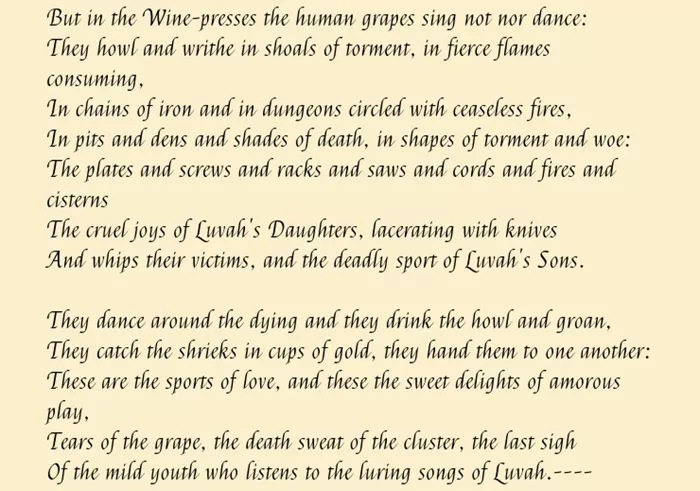Welcome to Poem of the Day – But in the Wine-presses the Human Grapes Sing not nor Dance by William Blake
William Blake, a renowned poet, artist, and visionary, is often celebrated for his unique approach to poetry and his deep philosophical insights. One of his more profound lines appears in his poem “But in the Wine-presses the Human Grapes Sing not nor Dance,” which explores themes of oppression, suffering, and the suppression of the human spirit. In this article, we will delve into the meaning of this line and explain the context of Blake’s words in simple terms.
But in the Wine-presses the Human Grapes Sing not nor Dance Poem
But in the Wine-presses the human grapes sing not nor dance:
They howl and writhe in shoals of torment, in fierce flames consuming,
In chains of iron and in dungeons circled with ceaseless fires,
In pits and dens and shades of death, in shapes of torment and woe:
The plates and screws and racks and saws and cords and fires and cisterns
The cruel joys of Luvah’s Daughters, lacerating with knives
And whips their victims, and the deadly sport of Luvah’s Sons.
They dance around the dying and they drink the howl and groan,
They catch the shrieks in cups of gold, they hand them to one another:
These are the sports of love, and these the sweet delights of amorous play,
Tears of the grape, the death sweat of the cluster, the last sigh
Of the mild youth who listens to the luring songs of Luvah.——
But in the Wine-presses the Human Grapes Sing not nor Dance Explanation
The Context of the Poem
The line in question is from Blake’s larger work, The Marriage of Heaven and Hell, which was written in 1790. In this work, Blake presents his thoughts on dualities such as good and evil, the spiritual and the earthly, and innocence and experience. The poem serves as an exploration of his thoughts on religion, society, and the human condition.
Blake uses vivid and often symbolic imagery in his poems. This particular line references the idea of “wine-presses,” which symbolizes the harsh, dehumanizing processes that individuals endure in life, especially under oppressive systems. The “human grapes” mentioned in the line suggest that people are being crushed, much like grapes in a wine press. These individuals are not free to “sing” or “dance,” indicating their inability to express joy, creativity, or their true nature due to the weight of their suffering.
Explanation of the Line
“But in the Wine-presses the Human Grapes Sing not nor Dance”
The Wine-presses: A wine press is a tool used to extract juice from grapes to make wine. It symbolizes a process of crushing, which often has negative connotations. In Blake’s work, the wine-presses represent the oppressive forces of society or systems of control that force individuals to conform and suppress their true selves.
Human Grapes: Grapes are typically associated with vitality and life. However, by comparing humans to grapes, Blake highlights the vulnerability of individuals in an oppressive environment. Like grapes being crushed in a wine press, human beings are subjected to suffering and exploitation. The “grapes” are not free but are instead being manipulated and controlled.
Sing not nor Dance: The act of singing and dancing symbolizes joy, freedom, and self-expression. Blake contrasts this with the “wine-presses,” suggesting that when people are oppressed or subjugated, they lose their ability to freely express themselves. The lack of singing and dancing indicates a loss of vitality and individuality, as people are forced into silence and submission.
The Meaning Behind the Line
In this line, Blake addresses the broader theme of human suffering under systems of power, especially societal and religious institutions. By using the image of grapes being crushed, Blake paints a vivid picture of how the human spirit can be oppressed. People in such systems are deprived of their natural joy, creativity, and freedom. They are denied the ability to “sing” or “dance”—symbols of life’s pleasures and self-expression.
Blake’s line suggests that when individuals are subjected to oppressive forces, they are often unable to live fully or authentically. They are denied the simple joys of life, and instead, their lives are reduced to mere survival, devoid of personal fulfillment or freedom.
Conclusion
William Blake’s line, “But in the Wine-presses the Human Grapes Sing not nor Dance,” serves as a powerful metaphor for the oppression of the human spirit. Through this image, Blake critiques the societal and religious structures that constrain individuals, preventing them from living freely and joyfully. His words are a timeless reminder of the importance of personal expression and the need to resist forces that seek to suppress human dignity and freedom.
In a world often filled with hardship and injustice, this line invites readers to reflect on the conditions that hinder personal growth and happiness, urging them to seek a life that is free, expressive, and full of vitality.

